
A software development team can have many members, occupying various roles.
Among those roles, lead developer and senior developer are the ones that tend to be the most confusing.
Are they the same, or are they different? Are both roles needed at the same time? What do they do, and what are they responsible for?
We can clear up a few things here: those are separate roles, they are both essential in their own way, and they are usually filled with experienced and knowledgeable developers.
Keep reading if you want to learn what more there is to it.
Table of Contents
Key responsibilities of a lead developer
As with most leaders in any industry, lead developers have a wide range of responsibilities—after all, a leader should be someone with versatile talents.
That’s even more true with lead developers. Not only do they need to have great technical skills, but they should also know their way around managerial duties.
In order to better understand the key responsibilities of a lead developer, let’s see how James Hickey, Microsoft MVP, and author, defines that role.

Hickey describes lead developers very well—they’re simultaneously a part of the development team and a link between developers and non-development departments.
That includes upper management also. Part of the lead developer’s responsibilities is communicating with project managers, the company’s CEO, and stakeholders.

Get unreal data to fix real issues in your app & web.
Being a developer is very helpful in that regard—they know how to translate information about projects and products between software developers and managers.
For example, Sami Hamed realized the importance of that when he became a lead developer at Acomodeo.
According to him, he found it very useful that he was able to understand what stakeholders wanted from the product and explain it to developers in a way that was actionable for them.
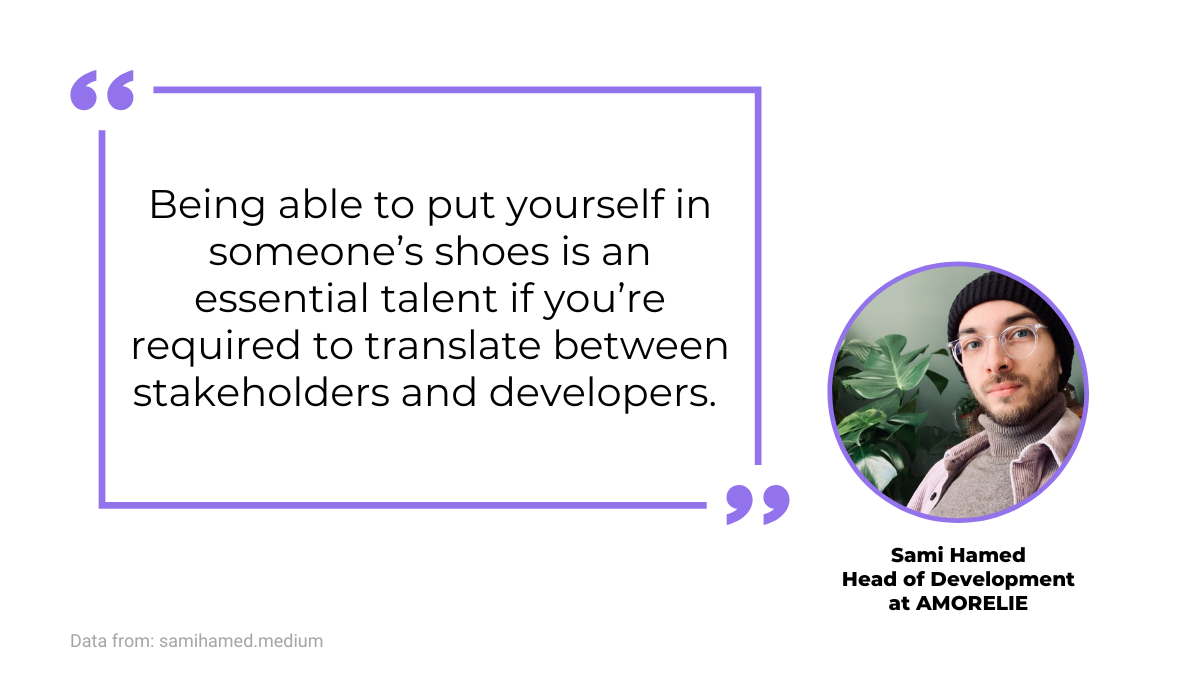
However, as we mentioned, lead developers are still developers, as the name suggests.
Therefore, they spend a part of their time writing code. How much? That depends on other responsibilities, projects, the team, and many other factors.
For instance, here’s Hamed’s experience after two years in the lead developer role.

Besides writing code themselves, lead developers are also responsible for supervising the code quality of other developers, typically by doing code reviews.
Whether they do it by pair programming, by using the over-the-shoulder technique, or software code review tools like Crucible is up to them—the point is to maintain the set standards across the team.

When we put all of that together, what does the lead developer’s job actually look like on a daily basis?
It can look something like this one below. It’s Stef Trenson’s work schedule, from when he worked as a lead developer at Teamleader.
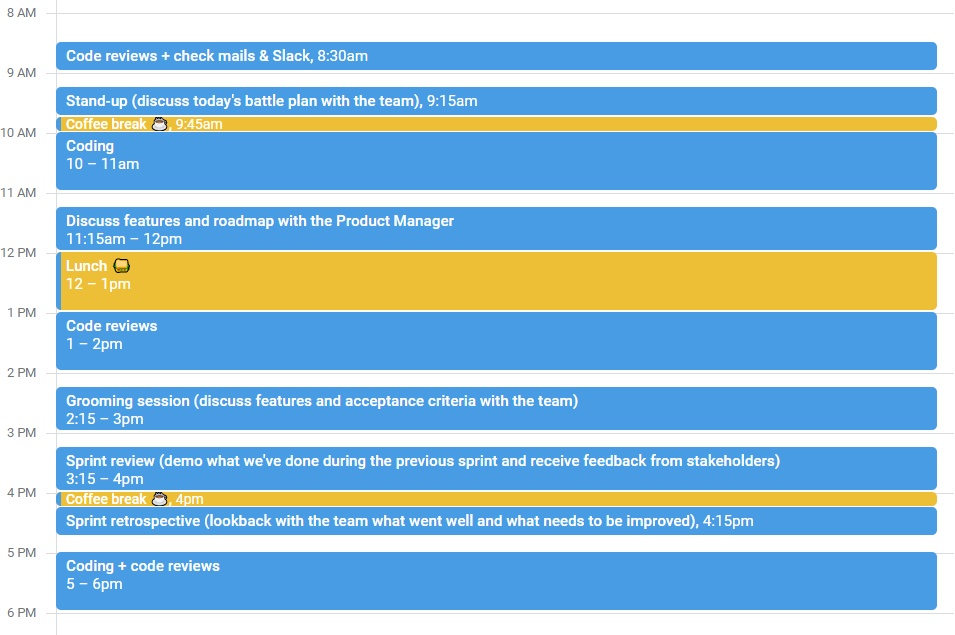
As you can see, he had all the responsibilities we mentioned.
His day was filled with various tasks, including coding and code reviewing, meetings with the development team and the Product Manager, and getting feedback from stakeholders.
The role of a lead developer is full of responsibilities, but what about the role of a senior developer? We’ll examine that in the next section.

Key responsibilities of a senior developer
The responsibilities of a senior developer are somewhat similar to those of a lead developer, but with one key difference—their focus isn’t on the same tasks.
A senior developer’s main responsibilities are with the technical aspects of software development, which means that everything that has to do with coding is their bread and butter.
For that reason, a senior developer is someone who has a vast knowledge of every aspect of software development.
Therefore, according to Colby Fayock, the senior part isn’t necessarily linked to the experience but rather to skills.
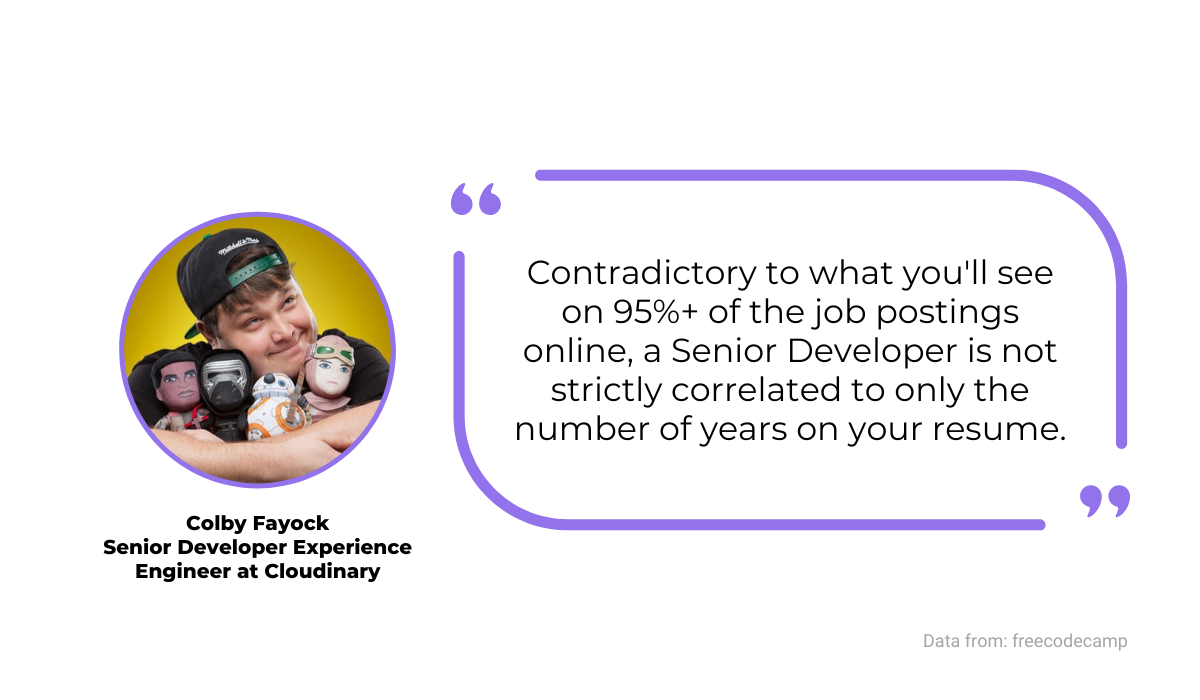
However, despite senior developers having extensive knowledge of programming languages, frameworks, software design, and other areas of software development, they naturally can’t know everything.
But, they have the responsibility to look for solutions, learn and improve, just as this tweet below illustrates.

As we mentioned, coding is one of the senior developers’ key responsibilities.
Besides writing code, they also usually do code reviews, similar to lead developers.
After all, they should be the most knowledgeable person directly assigned to the project, so it would be wasteful not to utilize their expertise in maintaining high code quality.

The responsibility of sharing the knowledge can also extend to mentoring other developers, another of the senior developer’s important tasks.
They often give advice and guidance to less experienced developers and help them find solutions to their problems.
Mentorship can be informal, but also more structured. Its nature depends on what the company requires.
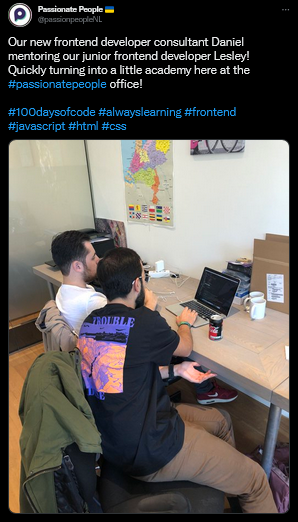
Mentorship can entail the previously mentioned code reviews, but also a broader task of advising junior developers on the direction of their career and areas they should specialize in.
For instance, Willem Spruijt focuses on his mentees’ growth, not only on coding practices.
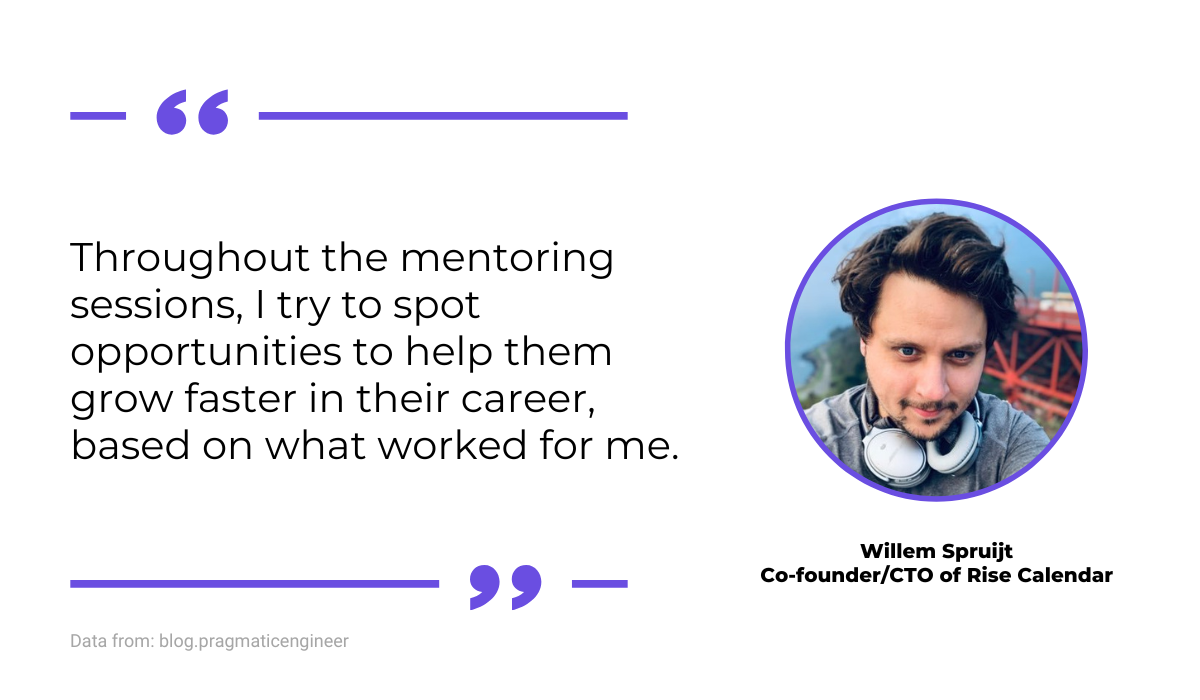
When we draw the line under this senior developer’s scope of duties, it boils down to being there for other developers to turn to when they need guidance.
Or, in the words of one software developer:
“The senior developer is the go-to person whenever you’re stuck.”
In conclusion, senior developers’ main responsibilities are to contribute with their expertise in writing code, reviewing it, and guiding other developers to the best possible results.
Although the roles of lead and senior developer seem similar, there are some key differences. Let’s explore them in more detail in the following section.
Lead dev vs. senior dev: key differences
In the previous sections, we looked at the key responsibilities of a lead and a senior developer and got a sense of what those roles entail.
However, as similar as they might be, we also mentioned that there are some key differences, which are important to pay attention to.
Let’s see what those differences are in more detail.
Differences in writing code
Both lead and senior developers write code as a part of their job.
They both have advanced coding skills, so it’s not surprising that companies want to tap into that knowledge to make the most out of it.
However, lead developers, as we discussed earlier, have a whole other set of managerial responsibilities which take time from writing code, so coding isn’t what they’re focused on.
For instance, according to Zeeshan Meghji, tech lead at AutoTrader, senior developers spend 70-100% of their time coding, while lead developers usually spend less than 60% of their time on that.
Whatever the exact percentage might be, one thing is certain—lead developers spend less time on coding than senior developers. That’s the Pascal de Vink’s experience, too.
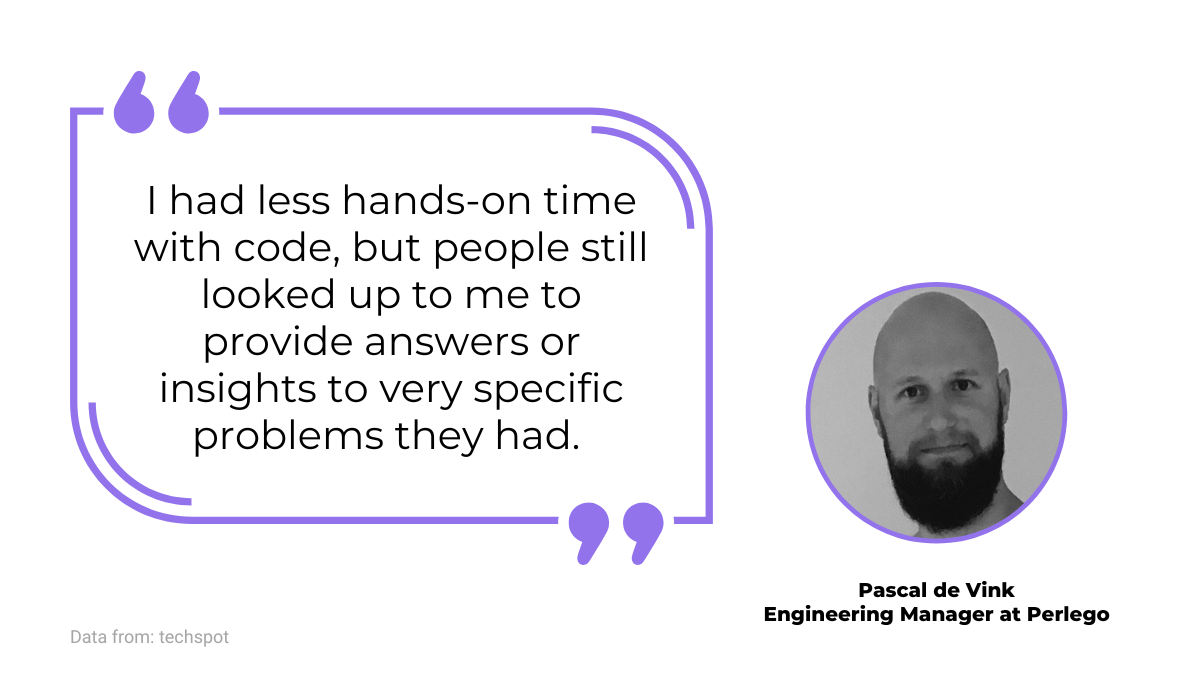
However, he touched on one more responsibility of a lead developer in the quote above—solving other developers’ issues.
That often comes in the form of code reviews.
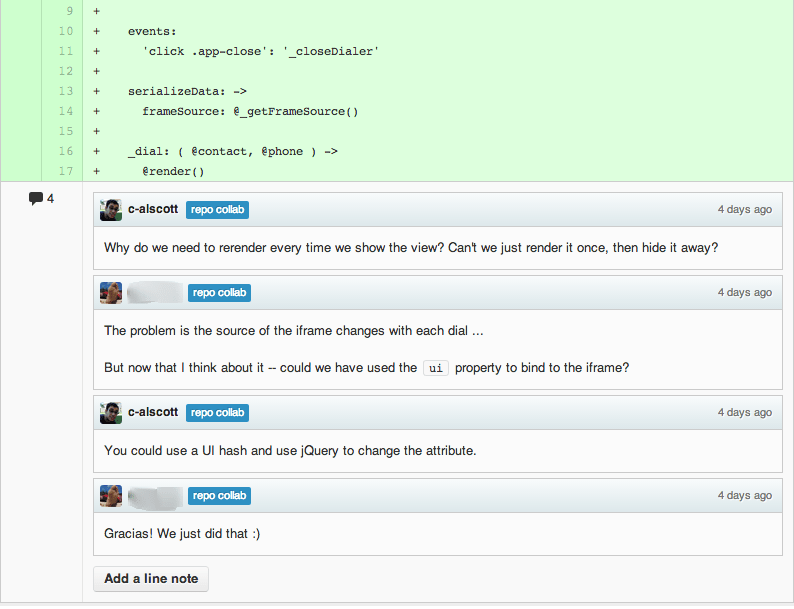
Both lead and senior developers do them, but the difference is that lead developers set the standard of code quality, best practices to follow while writing it, etc.—in short, they set the example for senior developers to follow in their own code reviews.
Differences in processes overview
One consequence of having different responsibilities is that lead and senior developers are focused on different work processes.
In simple terms, senior developers are accountable mainly for their own work.
Sure, as we mentioned earlier, they provide guidance and look after less experienced developers as needed, but their focus is on their own productivity.
On the other hand, lead developers should have the bigger picture in their minds most of the time.
That includes being accountable for the results and productivity of the development team in general.
For example, when employing DevOps practices, lead developers deal with the continuous integration, continuous delivery, and continuous deployment processes, while senior developers invest their time mostly in technical tasks.
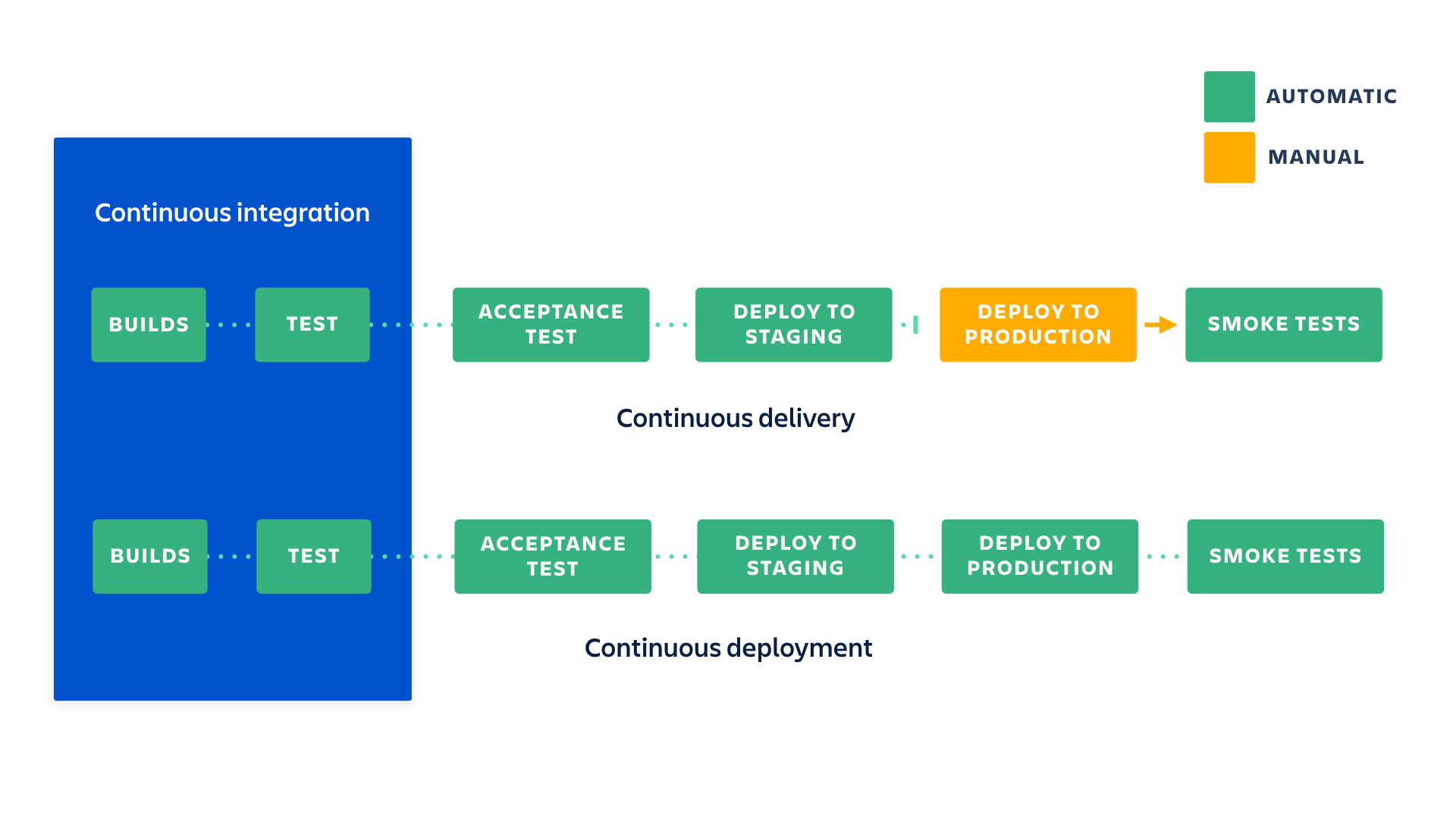
Team productivity is one of the lead developers’ primary concerns. That’s why they look for tools to improve it by automating repetitive and time-wasting tasks.
Our own solution, Shake, creates detailed automated bug reports that can save developers a lot of time and boost productivity overall.
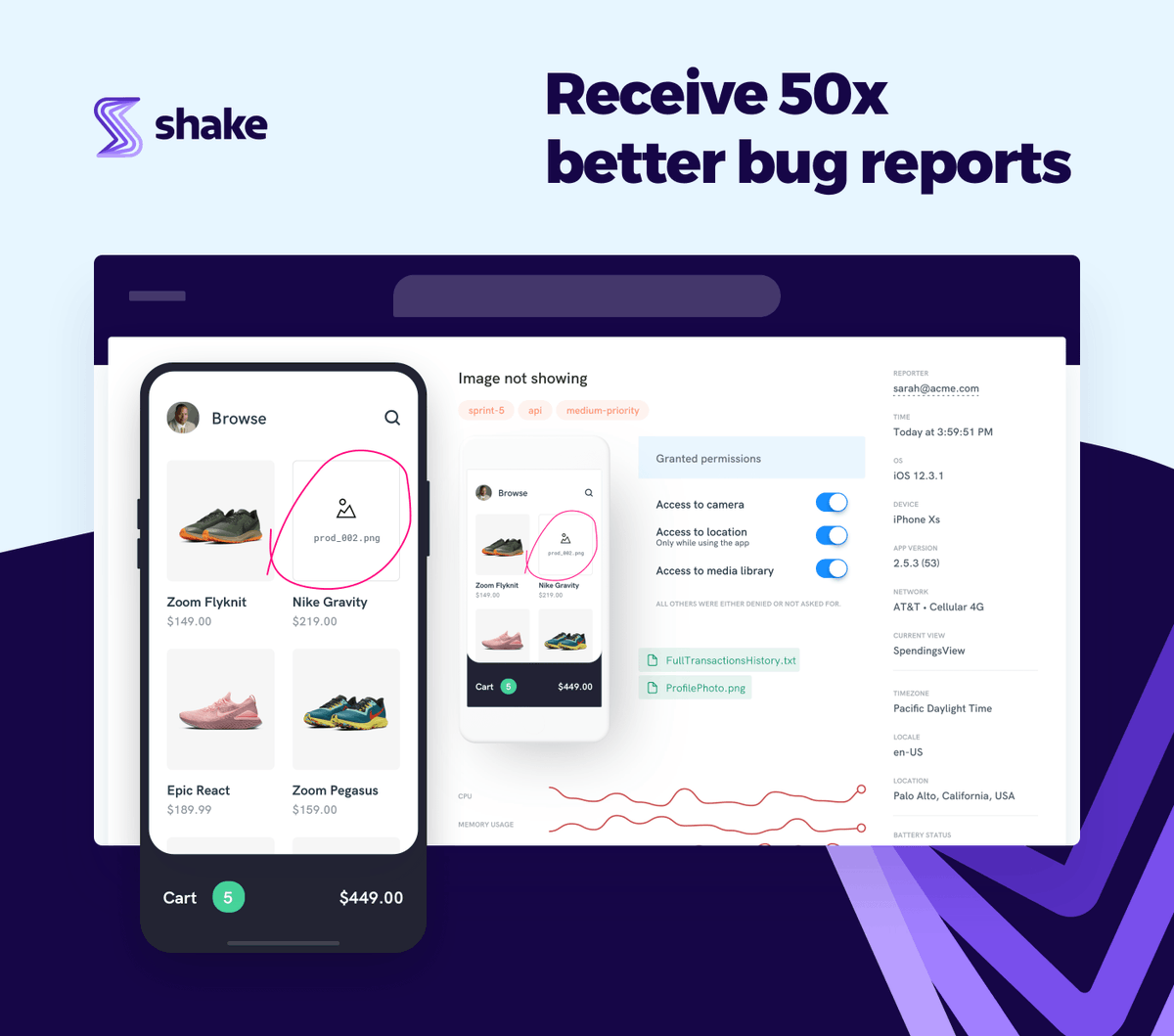
With one shake of the phone, users can create a comprehensive bug report containing every piece of information necessary for efficiently fixing the bug.
Lead developers can provide great tools like Shake to their development team and boost their productivity effortlessly.
Managerial differences
This is one of the most noticeable differences between lead and senior developer roles.
Part of the lead developer’s job is to manage. Although lead developers aren’t considered full-fledged managers, they have specific managerial tasks, as we mentioned before.
For example, that includes delegating work to other developers.
As Pascal de Vink explains, when he stepped into the lead developer role, he still had the instinct to do all of the coding and other tasks of a software developer.
But, he had to embrace delegating a good part of it.
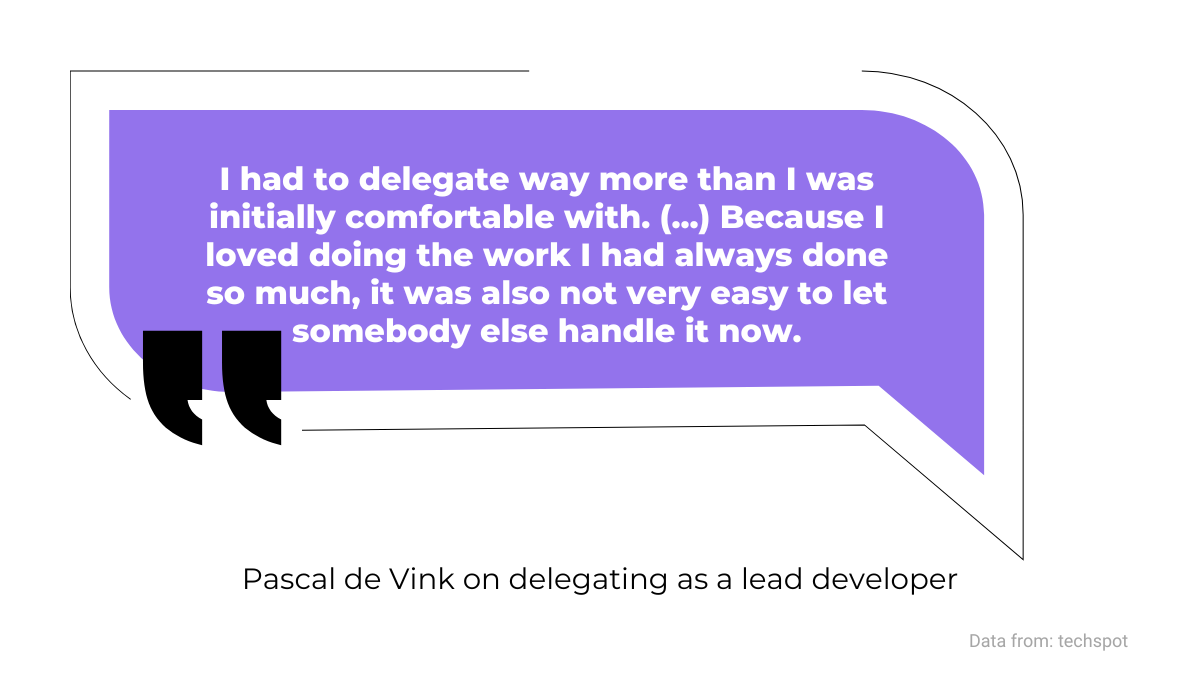
Delegating is vital for team productivity. A lead developer should be good at assessing the amount of work each developer can take to maximize their results.
On the other hand, a senior developer doesn’t have those worries. Managerial tasks aren’t a part of their work schedule.
Of course, they can still do their part in motivating and pushing a team to reach set goals, as they’re often considered authority figures.
However, that’s primarily a part of a lead developer’s responsibilities, as are other elements of leading a team to success.
Differences regarding department collaboration
Lead developers need to communicate with staff from other departments in the company much more than senior developers.
It’s a part of the previously mentioned bigger picture they should consider in their day-to-day work—ensuring that projects run smoothly and communicating that to Sales, HR, and other departments is part of the lead developer’s job.

Capture, Annotate & Share in Seconds with our Free Chrome Extension!
And let’s not forget communicating with the CEO and other managers. Being a bridge between the decision-makers and software developers is essential to good collaboration across the company.
That usually includes a lot of meetings. According to Dan Persa, former lead developer at Zalando, that can take a lot of time and energy.
You can see him talking about it in the video below from 5:48 onward.
Senior developers don’t have to worry about any of that.
Yes, meetings are still on their schedule, but usually those within the development team or with other departments, but as participants, not as one of the leading roles.
In conclusion, collaboration with other departments is an integral part of a lead developer’s job and not so much of a senior developer’s.
Conclusion
Lead developer and senior developer are roles that bring a lot of responsibilities.
People in any of those roles should be skilled and experienced developers, respected by others in the software development team.
That’s because both of them can be considered an indicator of how well the team performs—it’s unlikely that the results will be outstanding if the lead and senior developer aren’t up to the task.
The differences between their scope of work and activities are beneficial. Together, they cover a lot of ground and ensure that the team performs to the best of their abilities.





